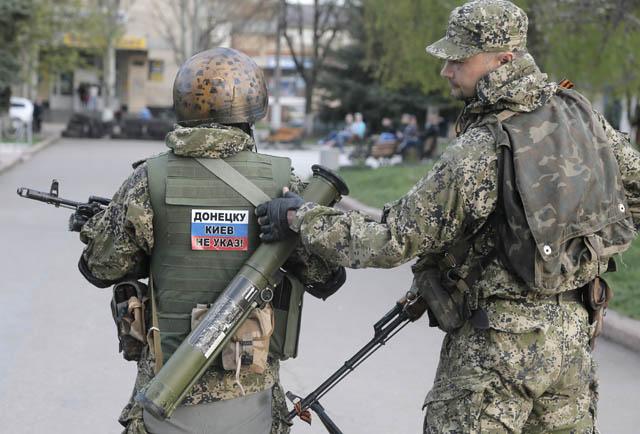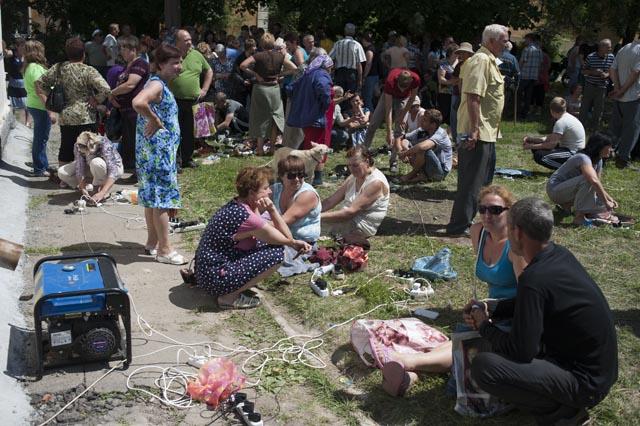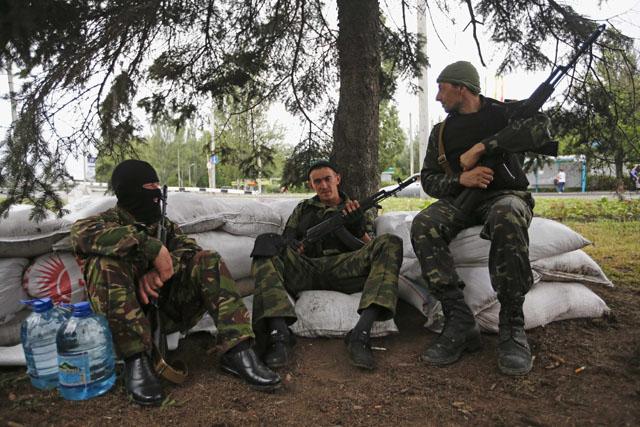You are here
Ukraine in ‘pivotal period’ as deal stalls; US warns Russia
By AFP - Apr 19,2014 - Last updated at Apr 19,2014

DONETSK, Ukraine — Russia was under US pressure Saturday to convince pro-Moscow rebels in Ukraine to cease occupying eastern towns, after Washington warned the situation in the former Soviet republic was in a “pivotal period”.
But with the separatists’ refusal to budge throwing a deal to defuse the crisis into doubt, and US sanctions looming large, Russia warned that its military was massed on Ukraine’s border, ready to act.
In the nearly dozen Ukrainian towns the pro-Kremlin rebels were holding, the stalemate dragged on Saturday.
In the major eastern city of Donetsk, gunmen remained barricaded inside the regional government building.
“We are going on as usual,” one of the rebels told AFP. “An Orthodox priest is inside with us and we are going to celebrate Easter tonight.”
The failure to implement the agreement hammered out in Geneva on Thursday by the US, Russia, Ukraine and the EU threatened to deepen the worst East-West crisis since the Cold War.
US Secretary of State John Kerry told Russian Foreign Minister Sergei Lavrov overnight that “full and immediate compliance” was needed of the pact, which calls for the disarmament of “illegal armed groups” and the end to the occupation of seized buildings.
Kerry “made clear that the next few days would be a pivotal period for all sides to implement the statement’s provisions”, a senior State Department official said.
US looking to Russia
for progress
US President Barack Obama has said he wants to see progress within days, otherwise more sanctions would be imposed, on top of those already targeting the inner circle of Russian President Vladimir Putin.
The United States, NATO and many EU countries see Putin as the puppet master behind the Ukraine insurgency. They accuse him of sending in elite Russian soldiers to stir unrest and ensure the country — parts of which are historically and linguistically tied to Russia — stays in Moscow’s orbit.
US National Security Adviser Susan Rice said on Friday that the White House was watching to see whether Russia uses “its very considerable influence to restrain and withdraw those irregular militia from the buildings and spaces that they’ve occupied”.
Putin denies his forces have any role in east Ukraine. On Thursday, however, he dropped an identical denial over Crimea, which Russia annexed from Ukraine last month, to finally admit the Russian army had in fact been deployed there.
The Russian leader said in a television interview to be broadcast later Saturday that the soldiers sent to Crimea would soon receive medals.
He also said he believed relations with the West could be normalised — but that “does not only depend on us. It depends on our partners”.
In a sign of the current prickly relationship with the West, Kremlin spokesman Dmitry Peskov said Friday the US threats of more sanctions on Moscow were “absolutely unacceptable”.
“One cannot treat Russia like it is a shameful student,” he said.
The West and Ukraine also had responsibility to make sure the Geneva deal worked, he said.
He also stressed that Russian troops were deployed “close to the Ukrainian border” — many of them sent there “due to the situation in Ukraine”.
NATO believes Russia has around 40,000 troops positioned on its border with Ukraine, in a state of readiness for an invasion.
Putin has said that he retained the right to send his army into Ukraine in order to protect Russian speakers there. On Friday, he repeated the assertion, though he said that he “very much hoped” he would not have to do so.
US vice president to visit
Although the United States has not given a deadline for compliance with the Geneva deal, US Vice President Joe Biden is due to visit Kiev on Tuesday.
He will be meeting leaders who have taken charge since the February ouster of pro-Kremlin president Viktor Yanukovych, after months of street protests that turned increasingly deadly.
Russia refuses to see the new Kiev government as legitimate, and the turmoil in Ukraine’s southeast could prove an obstacle to a planned May 25 presidential election.
The separatist leaders in the self-declared Donetsk Republic say they will not vacate public sites until the “illegal” government exits state buildings in Kiev.
But Yulia Tymoshenko, a former prime minister who is a leading candidate for next month’s presidential election, said she held talks with the Donetsk separatists on Friday that left her convinced that “compromise is possible”.
In concessions to the Russian-speaking militants, Ukraine’s interim president and prime minister have vowed to protect the Russian language, decentralise power and hold off further military action against the separatists until at least Tuesday.
Ukraine’s military has so far proven woefully inept in its efforts to dislodge the separatists. On Friday, in a rare success, the army said it had recovered two of six armoured vehicles captured by rebels during a disastrous military operation earlier in the week.
Yet a poll published Saturday suggested the majority of inhabitants in Ukraine’s restive east, while suspicious of Kiev’s authorities, had no desire to be subsumed into the Russian Federation.
The Russian-language Weekly Mirror newspaper said 52.2 per cent of the 3,200 respondants to the survey by Kiev’s Institute for International Sociology were against coming under Russian rule while 27.5 per cent were in favour.
In a gesture of national unity, despite the political differences, around 50 Kiev residents on Saturday sent Easter cakes to people in Ukraine’s east along with greeting cards.
“I wrote that we Ukrainians are a united people, we should live in a united country, we should not be divided,” one of them, 12-year-old Maxym, told AFP.
Related Articles
Ukraine’s new Western-backed President Petro Poroshenko got down on Sunday to the Herculean task of pacifying a deadly pro-Kremlin insurgency and averting a devastating Russian gas cut.
Ukraine’s interior minister said on Saturday that most pro-Russian rebels and their top commander had fled their main eastern stronghold in what would be Kiev’s biggest success of the nearly three-month campaign.
Ukraine’s new pro-Western leader enters a defining week Sunday seeking to head off a Russian gas cut and secure US President Barack Obama’s backing with his country threatened by civil war.













